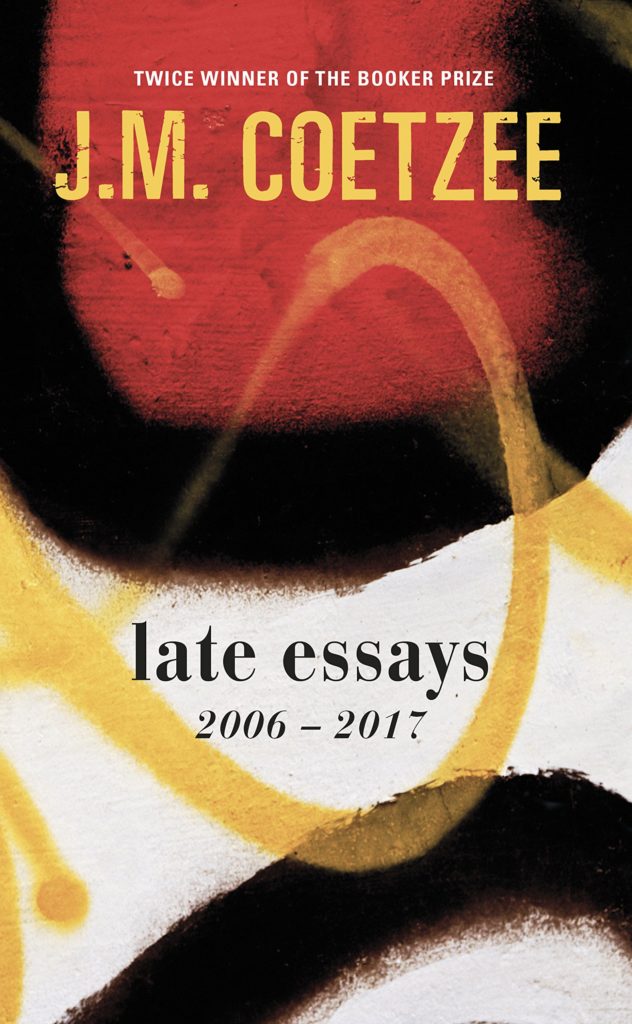John Maxwell Coetzee is justly celebrated as one of the greatest living novelists, a recipient of nearly every major literary award – some of them more than once – but he is also, perhaps not surprisingly, one of our greatest living readers, a lifetime devotee of literature, and his Late Essays are largely an exercise in appreciation. Twenty different writers are covered in these pages, some of them across multiple essays and in a great deal of depth, others in broader strokes, as if Coetzee is coaxing us to investigate for ourselves his preferred writers. What is common to each is Coetzee’s vast erudition, the benefit of a lifetime of reading, and part of the reader’s enjoyment stems from witnessing his mind recalling, recollecting, making connections and passing judgments over centuries’ and continents’ worth of literature.
Take, for example, the second essay on Ford Maddox Ford, a contemporary of Joyce and T.S. Eliot, and a fixture at the Parisian literary gatherings hosted by Gertrude Stein, but today less widely known than his fellow ex-pats Hemingway and Fitzgerald. Coetzee is withering in his indictment of the bulk of Ford’s writing:
Surprisingly, for a writer who revered Flaubert for his exhausting labours over Madame Bovary and his uncompromising quest for le mot juste, who in addition had had the privilege of collaborating with Conrad and seeing at first hand the agonies of doubt that Conrad underwent over his own writing and the massive revisions he undertook, Ford himself published one novel after another in which the construction is careless, the plot uninteresting, the characterizations shallow, and the prose merely passable.
But this scorn only serves to underscore Coetzee’s judgment that The Good Soldier and Parade’s End – Ford’s most famous novels – are “indubitable masterpieces,” and “the work of a painstaking craftsman,” whose absorption of Flaubert’s Madame Bovary and his cuckolded husband permeate his portrayal of failing marriages in Edwardian England. Nowhere in this essay does Coetzee mention his own formal study of Ford Maddox Ford, but his Master of Arts degree from the University of Cape Town was awarded for a thesis entitled “The Works of Ford Maddox Ford with Particular Reference to the Novels.”
Coetzee’s erudition is perhaps most on display in “Translating Hölderlin,” which is not only a synopsis of the German poet’s life and work but an investigation into his reception throughout history, including by proponents and opponents of Nazism. These insights are buttressed by Coetzee’s own ability to read and speak German (his mother was of Dutch-German descent, and he has a special interest in the German language and literature), which leads him to alternately praise and criticize the artistic decisions of Hölderlin’s various translators (“…the musical effect he achieves in English is ravishing, capturing exactly the tone of hope, tentative yet vibrant, with which Hölderlin confronts defeat, a tone that characterizes both his grasp of his vocation and his vision of history.”).
No less than four of the essays are devoted to the life and writings and literary philosophy of Samuel Beckett, giving us yet another opportunity to marvel at Coetzee’s thoroughness: he has read all of Beckett, of course, but also his correspondence (extending to more than four volumes), multiple biographies, and the memoirs of Beckett’s own therapist, a famous psychologist in his own right. In “Eight Ways of Looking at Samuel Beckett,” Coetzee takes us on a whirlwind tour of Beckett’s reception, intermingling with the commentary of writers and critics his own personal assessments, and invoking Herman Melville, René Descartes, William James and the eternal mind-body problem to shed light on Beckett’s writings. “The universe [Beckett’s universe, that is] is interested not in what you can understand but at what point you cease to understand.”
In form and in tone, Coetzee’s Late Essays are a compendium of appreciations, a thorough and enthusiastic summing up of the works of imagination that helped to shape his own outlook and output, and a dazzling display of the brilliance and broad range of his own intellect, capable of subsuming the widest array of poets, playwrights and novelists across time and space.
